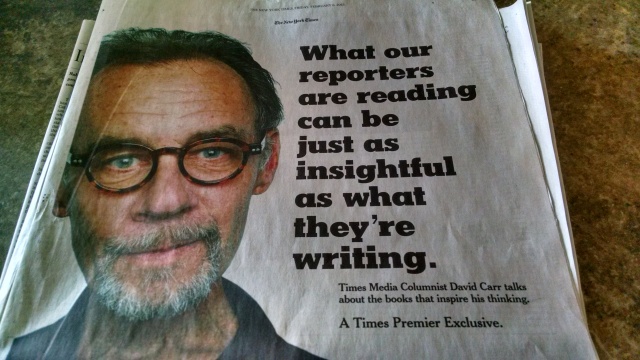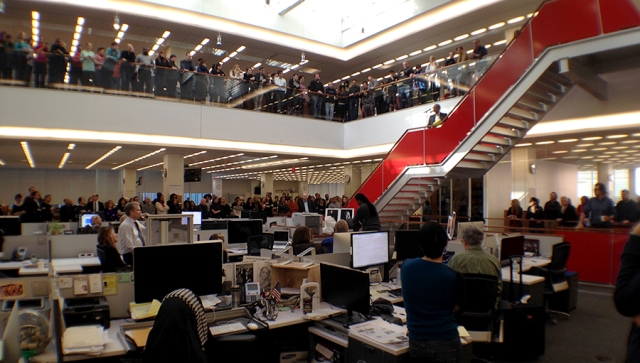By Caitlin Kelly

As I blogged here a few years ago, journalism — at best — is a tribe:
The tribe, regardless of age, race, gender, religion or nationality, has time-honored rituals, the shared and inevitable scars we’ve acquired and sometimes discuss over a beer in Berlin or at a conference in Boston or at a presser in Brooklyn or Doha. The breathtaking self-assurance of some, that so often spills over into arrogance, hides the truth we all really know. Every one of us will err, whether it shows up in the paper’s corrections box or remains a private and unresolved matter of conscience. Within this industry, at almost any level of the game, there’s daily doubt and fear, confusion and pain — and, sometimes, great, shared joy when we’ve done it well.
No matter where you live or what you earn, if you yearn to tell as many truthful, fact-based stories to strangers as possible, you share a passion with other journalists that’s hard to explain to everyone else. People I call “civilians.”
The military is like that, I hear, bound by codes of honor and behavior, of hazing and terror, that only initiates truly understand and share.
Some journalists write about technology, hanging out with guys in hoodies. Others work the frontlines of wars and conflicts.
But, whether we’re a fresh grad or a grizzled 50-year-old, we all know it’s damn hard to get and keep a good job in our field — i.e. one that pays more than $60,000, (many earn in the mid-40s), and where your bosses are still somewhat decent human beings whose judgment you respect.
If you, like me, have been the J-game for a few decades, you’ve read, heard or watched the work of hundreds of other journalists, sometimes with irritation, sometimes with envy and deep admiration for their access, skill and visibility. Many flame out. Some go into public relations or teaching.
A very fortunate few, like Brian Williams, a television anchor, pull in a cool $10 million a year. Most of will be lucky to ever make six figures in any year.
In the year 2008, 24,000 of us lost our jobs, so anyone who has one, still, is damn lucky and we all know it.
The past week has been a shitshow for our industry.
The death — of all things, while riding in the back of a New York City limousine — of legendary, 72-year-old CBS News correspondent Bob Simon. A man who had covered the world and survived many harrowing and dangerous assignments.
The death of female, Canadian baseball writer Alison Gordon, at 72, who, in her off hours, played (of course) in a band. She was the first woman to cover Major League baseball, beginning in 1979. I was offered a sports reporting job in 1985 and said no. I knew how incredibly rough, then, that ride would have been for a woman trying to cover what was still very much a man’s world. (Sent to cover a major league hockey training camp then, I watched every man there get a complete press kit. “Oh, we’re all out!” I was told.)
“She was relentless,” said Lloyd Moseby, who played for the Jays throughout the 1980s. “A lot of women that are in the profession right now should be very thankful for what Alison did and what she went through. She took a beating from the guys. She was a pioneer for sure.”
The sudden death Thursday night of New York Times media columnist and author David Carr, at 58. He had just finished moderating a panel discussion next door in the Times’ auditorium, went upstairs to the newsroom and collapsed there. He died that evening in the hospital, leaving a wife and three daughters. Carr, probably the least likely writer to join the staff of the Gray Lady — as a former coke addict — won tremendous respect from his peers, there and elsewhere, for his crazy hard work, sense of humor and no-bullshit worldview. Covering other journalists and their companies is a gig many of us would happily avoid; we like to be the observed, not the publicly-pulled-to-pieces. And where would he go if he ever needed another job?
One of his many bons mots, (which so many of us long to shout!): “I don’t do corporate portraiture.”
My husband works at the Times and knew David there; one day he shared an elevator with him. “How are you?” asked Jose. “Happy!” Carr shouted.
That, so un-Timesian raucous and, always, real, was Carr.

photo by Jose R.Lopez
The newsroom filled at 3pm Friday for his colleagues’ many tributes to, and speeches about him, heartfelt laughter and tears. For a tough-minded, elbows-out culture like the Times, the outpouring of love and respect was unprecedented.
Here’s a lovely piece about him from The Globe and Mail (my first newspaper employer.) I’ve worked for three big dailies; Carr, more than many, knew and really appreciated what a fantastic, fun gig a newspaper job can be. I loved it and miss it terribly.
The firing of Jared Keller, the news director of Mic, a popular website, after charges of plagiarism. He had previously worked for Bloomberg, Al Jazeera and the Atlantic — which is to say, for non-journos, he had already enjoyed a pretty nice career in an industry pretty much in chaos these days. Why blow it?
The six-month unpaid suspension of NBC News anchor Brian Williams, for his inability to clearly recollect memories others had to explain to him. I normally watched his show but was appalled when, in his nightly news broadcast, he mentioned his daughter, Alison Williams, a regular on the HBO series Girls, appearing in a show of Peter Pan — with no nod whatsoever to their family relationship. Seriously?!




